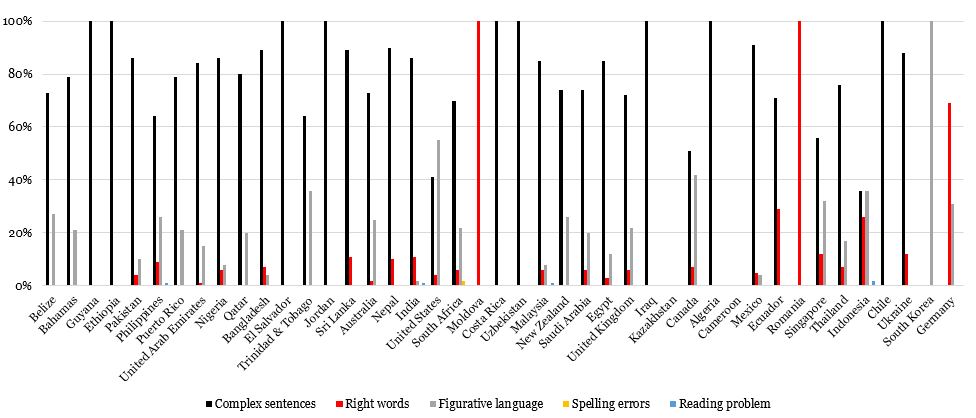
From 55 countries of the world, language disorders have largely occupied the minds of many global citizens in the last 5 years. According to the world interest in the receptive and expressive disorders, Zambia remains the leading country, where people have been developing interest in the last 5 years. Germany, Dominic Republic, Chile and Austria follow the East African country.
The United States of America is 36th among the countries that have been developing interest in the disorders since 2016. Different sources have shown levels of varied forms of disorders. Between 6 and 8 million individuals in the United States have some form of language impairment. Approximately 7.5 million people in the United States have trouble using their voices. Disorders of the voice involve problems with pitch, loudness, and quality. The American public interest in language disorders from infancy through adolescence mostly common in the United States of America is on increase since 2016.
A number of academic and industrial sources show that the world language disorders impact both the understanding and use of language. Failure to identify the symptoms of the disorders early on has been linked to the inability to have proper care for the affected with the possibility of ensuring total cure. One of the sources lists symptoms of specific language impairment in older children and adults as “limited use of complex sentences, difficulty finding the right words, difficulty understanding figurative language, reading problems, disorganized storytelling and writing and frequent grammatical and spelling errors.”
Register for Tekedia Mini-MBA edition 19 (Feb 9 – May 2, 2026): big discounts for early bird.
Tekedia AI in Business Masterclass opens registrations.
Join Tekedia Capital Syndicate and co-invest in great global startups.
Register for Tekedia AI Lab: From Technical Design to Deployment (next edition begins Jan 24 2026).
These symptoms are not exclusive to a particular country or continent. They are almost emerging in every country and continent. This specifically explains the essence of rapidly working towards full realisation of strategic objectives in the World Disability Action Plan 2014-2021 [PDF] and carrying unrealised objectives to the next years.
Exhibit 1: Interest in Select Language Disorders’ Symptoms

Between November 5, 2017 and October 31, 2021, our analysis reveals significant relational interest in complex sentences, right words, figurative language, spelling errors and reading problem. According to our analyst, the global public, especially people in countries listed in Exhibit 1, had a strong interest in understanding how to use complex sentence and right words in their conversations [both written and verbal].
One percent interest in learning complex sentences translated to 89.1% in knowing the right words for sentence construction and use during verbal conversation. It significantly emerged that when the global public had a 1% interest in understanding complex sentences, it led to 96% of seeking knowledge about spelling errors and 90.9% in finding possible tactics for overcoming reading difficulties. Seeking knowledge about reading difficulties, in our analysis, largely connected with interest in understanding spelling errors.
These insights are further explored with a series of conversations with educationists and language therapists. They all agreed that the surge in complex sentence and right words is not surprising considering the fact that the world is not really interested in reading printed books where they could be easily learned. They note that emerging technologies such as social networking sites are impacting acquisition and use of appropriate language skills. Beyond these, some of the symptoms emerged from the deficient childhood care.
Addressing language disorders using holistic and inclusive approaches would significantly help countries in reducing the number of people who dive into intellectual disability yearly, which has the tendency of impacting economic growth severely, especially in the developing world. The definition of the World Health Organisation on intellectual disability absolutely resonates with the listed symptoms of language disorders. According to the global health body, “a significantly reduced ability to understand new or complex information and to learn and apply new skills (impaired intelligence).”
Our analyst believes that collective strategies and tactics from concerned stakeholders in the private and public sectors are needed to avert disable economy, most importantly in countries where a significant number of the population is having different language disorders which prevent them from delivering appropriate the assigned tasks.



